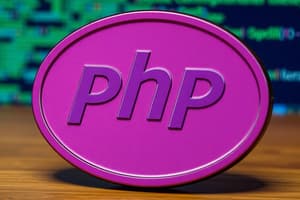Podcast
Questions and Answers
Who developed PHP initially?
Who developed PHP initially?
- apache developers
- Rasmus Lerdorf (correct)
- Zeev Suraski and Andi Gutmans
- mysql team
What does PHP stand for currently?
What does PHP stand for currently?
- Powerful Hypertext Processor
- PHP: Hyperactive Processing
- PHP: Hypertext Preprocessor (correct)
- Personal Home Page
What is a key feature of PHP as a server-side scripting language?
What is a key feature of PHP as a server-side scripting language?
- It only supports MySQL database
- It is a loosely typed language (correct)
- It is a client-side scripting language
- It is a statically typed language
What is required to run PHP scripts?
What is required to run PHP scripts?
How do you enclose PHP code?
How do you enclose PHP code?
What is the purpose of the 'echo' and 'print' statements in PHP?
What is the purpose of the 'echo' and 'print' statements in PHP?
What is type casting in PHP?
What is type casting in PHP?
What is the purpose of the 'gettype()' function in PHP?
What is the purpose of the 'gettype()' function in PHP?
What is the primary function of the foreach loop in PHP?
What is the primary function of the foreach loop in PHP?
What is the purpose of the define() function in PHP?
What is the purpose of the define() function in PHP?
What is the difference between the GET and POST methods in PHP?
What is the difference between the GET and POST methods in PHP?
What is the purpose of the preg_match() function in PHP?
What is the purpose of the preg_match() function in PHP?
What is a primary key in a database?
What is a primary key in a database?
What is the purpose of the session_start() function in PHP?
What is the purpose of the session_start() function in PHP?
What is the purpose of the explode() function in PHP?
What is the purpose of the explode() function in PHP?
What is the purpose of the var_dump() function in PHP?
What is the purpose of the var_dump() function in PHP?
Flashcards are hidden until you start studying
Study Notes
Module 1: Introduction to PHP
- PHP was developed by Rasmus Lerdorf in 1994/1995
- Originally stood for Personal Home Page, later changed to Hypertext Preprocessor
- Key features of PHP:
- Server-side scripting language
- Loosely typed language
- Many built-in libraries and functions
- Supports many databases
- Free and open source
- Software requirements:
- Operating System: Windows, Linux, or Mac
- Web Server: Apache, Google Web Server, etc.
- Database: MySQL, Oracle, etc.
- Code Editor: Notepad++, Eclipse, Dreamweaver, etc.
- To run PHP scripts:
- Install XAMPP/WAMP
- Start Apache and MySQL services
- Save PHP files in htdocs folder
- Access via localhost in browser
- PHP syntax basics:
- PHP code is enclosed in <?php ?> tags
- Statements end with a semicolon
- echo and print are used for output
- Variables start with a $ symbol
- Comments: // for single line, /* */ for multi-line
- PHP data types:
- Scalar: boolean, integer, float, string
- Compound: array, object
- Special: NULL, resource
- Type casting:
- Changing variable types explicitly
- Examples: (int), (float), (string), (array), (object), etc.
Module 2: PHP Operators and Control Structures
- Arithmetic operators: +, -, *, /, %, **
- Assignment operators: =, +=, -=, *=, /=, %=, etc.
- Comparison operators: ==, ===, !=, !==, <, >, etc.
- Increment/Decrement operators: ++, --
- Logical operators: &&, ||, !, and, or, xor
- String operators: . (concatenation)
- Array operators: +, ==, ===, !=, !==
- Operator precedence and associativity:
- Understand order of operations
- Use parentheses to clarify intent
- Control structures:
- Conditional: if, else, elseif, switch
- Loops: while, do-while, for, foreach
- Break, continue, goto statements
- Alternative syntax:
- Replace { } with : and endif;, endwhile;, endfor;, etc.
Module 3: PHP Arrays and User-Defined Functions
- Arrays:
- Indexed arrays: numeric keys
- Associative arrays: string keys
- Multidimensional arrays: arrays within arrays
- Array functions:
- print_r() and var_dump() for debugging
- sort(), rsort(), asort(), arsort(), ksort(), krsort()
- unset(), explode(), implode()
- Looping through arrays:
- foreach loop
- User-defined functions:
- function keyword
- Parameters and return values
- Variable scope: global, local, static
Module 4: PHP Predefined Functions
- Constants:
- define() function
- Including files:
- include, require, include_once, require_once
- Mathematical functions:
- rand(), ceil(), floor(), min(), max(), number_format()
- String manipulation functions:
- strlen(), strpos(), strrev(), strtolower(), strtoupper(), substr()
- ucfirst(), ucwords(), trim(), ltrim(), rtrim(), strip_tags()
- Date and time functions:
- date(), mktime(), strtotime()
- Date format characters (Y, m, d, H, i, s, etc.)
Module 5: PHP Web Forms and Form Validation
- Superglobal variables:
- SERVER,_SERVER, SERVER,_GET, POST,_POST, POST,_REQUEST, COOKIE,_COOKIE, COOKIE,_SESSION, $_ENV
- Form handling:
- Difference between GET and POST methods
- Processing form data
- Cookies:
- setcookie() function
- Reading and deleting cookies
- Sessions:
- session_start(), session_destroy()
- Setting and unsetting session variables
- Regular expressions:
- preg_match() function
- Common regex patterns and modifiers
- Form validation using regex (e.g., email validation)
Module 6: MySQL Database
- Introduction to databases:
- Definition: Ordered collection of information for quick access
- Structure: Tables, records, and fields
- Types: Flat-file vs. Relational databases
- Key concepts: Primary key, Foreign key, Normalization
- MySQL basics:
- Open-source relational database management system
- Features: High availability, scalability, and performance
Studying That Suits You
Use AI to generate personalized quizzes and flashcards to suit your learning preferences.




